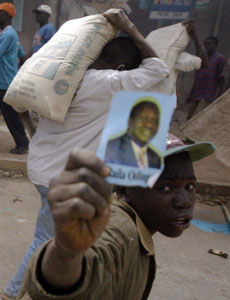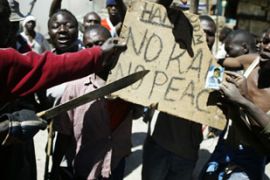Video from a helicopter chartered by the Red Cross showed hundreds of homes and farms in flames; groups of people were seen seeking sanctuary at schools and the airport, while others moved into the forest.
An estimated 70,000 people have been displaced by the unrest in western Kenya, the Kenya Red Cross said.
A Catholic priest in the town said thousands of terrified Kikuyu – the tribe of Mwai Kibaki, the president – had taken shelter in churches.
“There are four to five thousand in the main cathedral, and thousands in other churches,” Father Paul Brennan said.
“Houses are being burned. It is too dangerous to go outside and count the dead.”
A local reporter said the mob of youths went to the church near Eldoret and overpowered boys who were guarding it before setting it on fire.
‘Hacking and torching’
George Karanja, whose family had sought refuge at the church, said the mob which arrived on Tuesday morning was made up of about 2,000 people.
“They started burning the church,” he said. “The mattresses that people were sleeping on caught fire. There was a stampede, and people fell on one another.”
Karanja, 37, helped pull out at least 10 people, but could not save his 11-year-old nephew.
Up to 50 people were killed in the attack, said a Red Cross official who spoke on condition of anonymity because her name would identify her tribe and she feared reprisal.
Even first aid workers were stopped by vigilantes who demanded their identity.
Karanja said his two children raised their hands as they left the church and they were beaten with a cane, but not killed. His 90-year-old father was attacked with a machete, but survived, he said.
“The worst part is that they were hacking people and then setting them on fire,” he said.
The attackers saw Karanja saving people and began stoning him, he said.
 |
More than 250 have died in the aftermath
of last week’s polls [AFP] |
Karanja said he ran and hid – submerging himself in a pit latrine outside the church property – for about 30 minutes until he heard people speaking Kikuyu.
The attack pushed the toll in the aftermath of last week’s election to more than 250 people and raised fears that ethnic violence may spiral out of control.
Kibaki was sworn in on Sunday after official election results showed he narrowly beat opposition leader Raila Odinga.
Both sides have accused the other of massive vote-rigging during the December 27 election and the dispute ignited long-simmering tribal rivalries in one of Africa’s most stable democracies and strongest economies.
World powers have called for calm and urged the political opponents to “exercise restraint” and talk to each other.
Kibaki has said that all political parties should meet immediately and publicly call for calm.
‘President must concede’
But Odinga told Al Jazeera that he would only talk to Kibaki if the president conceded defeat.
“This is a time for reconciliation, but there must be a basis for that reconciliation,” he said on Tuesday. “I am ready to talk to Mr Kibaki on condition that he is ready to admit before the people of Kenya that he lost the elections.”
Results disputed Most of Kibaki’s cabinet lost their seats in parliament after elections on December 27 but Kibaki was declared the winner of the presidential poll.
The discrepancy between the results, unexplained delays in vote tallying and anomalies that included a 115 per cent turnout in one constituency have fuelled allegations of vote rigging.
 |
Odinga has said he will talk to Kibaki only
if the president concedes defeat [AFP] |
European Union election observers have said that the poll fell short of international standards and have called for an independent audit into the results.
Raphael Tuju, Kenya’s foreign minister, told Al Jazeera that there was no reason for Kibaki to resign and problems with the election should be dealt with through the courts rather than through protest.
“Whatever is to be done, whether we are going to have a re-run, that has to be decided in a constitutional way,” he said.
“You just don’t decide because one of the parties is aggrieved, because one party complains, or one person complains. ‘OK, you are not happy with the results of the election, let’s have a re-run’.”
The toll has continued to rise and the continuing violence has raised fears that Kenya could descend into ethnic conflict.
The Daily Nation newspaper said on Tuesday that it feared that Kenya was on “the verge of a complete meltdown”.
Most deaths have come from police firing at protesters, witnesses say, prompting accusations from rights groups and the opposition that Kibaki had made Kenya a “police state”.
Slum areas in Nairobi were overrun by rioters burning down shops belonging to members of Kibaki’s Kikuyu tribe and looting anything from refrigerators to basic goods.
In the Mathare slum, Odinga supporters, shouting “No Raila, no peace!” torched a minibus and attacked Kikuyu travellers.
“One tribe is targeting another one in a fashion that can rightly be described as ethnic cleansing,” a senior police official in Eldoret told the AFP news agency on condition of anonymity.
‘Hooliganism and thuggery’
Odinga, who comes from the Luo, the second largest tribal grouping in Kenya after the Kikuyu, said that people should stop “engaging in acts of hooliganism and thuggery”.
“We say that out demonstrations must be peaceful, we are going to carry out demonstrations and protests countrywide, but in a peaceful way,” he said.
Police have banned a mass rally planned for Nairobi on Thursday saying that it does not have enough resources to provide security for the event.
Michela Wrong, an author and journalist, told Al Jazeera that although the violence was taking place along ethnic lines, it was really about the divisions between rich and poor.
“That’s the ugly surface of a much more profound split. There is a sense that this was an elitist government, it was a government that was really only interested in itself, in its own particular group,” she said.
“They were doling out jobs to their own people, all the key ministries were in the hands of that group but at the same time were ignoring the needs of the poor.”



